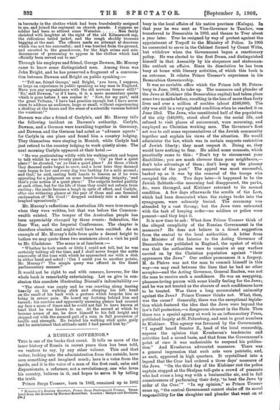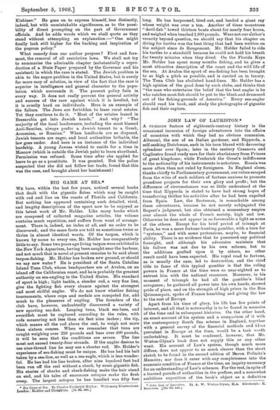A RUSSIAN GOVERNOR.*
Tim is one of the books that count. It tells us more of the inner history of Russia in recent years than has been told, we venture to say, by any other volume. This and that writer, looking into the administration from the outside, have seen something and imagined much; here is a voice from the inside, and it is the voice of a man of the first rank, calm and dispassionate, a reformer, not a revolutionary, one who loves his country, believes in it, and hopes to serve it by telling the truth.
Prince Serge Urossov, born in 1862, remained up to 1902
* Memoirs of a Russian Governor, Prints Serge Dmitripevich Urossov. Trans- lated from the Russian by Herman Rosenthal. London: Harper and Brothers. [Sal
busy in the local affairs of his native province (Kaluga). In. that year he was sent as Vice-Governor to Tambov, was transferred to Bessarabia in 1903, and thence to Tver about a year later. Tver he resigned by way of protest against the appointment of Trepoff to the Ministry of Police. In 1905 he consented to serve in the Cabinet formed by Count Witte, but withdrew when the Government began a reactionary policy. He was elected to the first Duma, and distinguished himself in that Assembly by his eloquence and statesman- like outlook on affairs. Since its dissolution he has been busy at home with literary activities, of which this book is an outcome. It relates Prince Urossov's experience in his Bessarabian Governorship.
It was no enviable office which the Prince left St. Peters- burg in June, 1903, to take up. The massacre and plunder of the Jews at Kishinev (the Bessarabian capital) had taken place some two months before, resulting in the loss of more than forty lives and over a million of roubles (about £160,000). The city was still in a very agitated condition when he reached it on June 23rd. The Jews, who constituted half of the population of the city (140,000), stood aloof from the social life, and refused to visit places of amusement, wore mourning, and
employed no Christian working men. The Governor's first act was to call some representatives of the Jewish community together and explain his views of the situation. He would
administer the law, which was in certain respects restrictive of Jewish liberty; they mast respect it. Doing so, they would have nothing to fear. He added some counsels, which
practically came to this : "Don't try to circumvent your disabilities ; you are much cleverer than your neighbours,—
don't take advantage of them; don't keep up the gloomy memories of the past." The appeal was most successful, backed up as it was by the removal of the troops who
occupied the city. Two days later—it happened to be the
Jewish Sabbath—the mourning had disappeared, the parks, &c., were thronged, and Kishinev returned to its normal condition. A few days afterwards the scrolls of the Law,
which had been desecrated when the rioters broke into the were solemnly buried. The ceremony was attended by a vast throng; but the Jews were entrusted with the task of keeping order—no soldiers or police were present—and they kept it.
It is now time to ask : What does Prince Urossov think of the alleged complicity of the Russian Government in the massacre ? He does not believe in a direct suggestion from the central to the local authorities. A letter from the Minister of the Interior to the Acting Governor of Bessarabia was published in England, the upshot of which was that the authorities were to connive at any warfare carried on by the Christian population against " their oppressors the Jews." Our author pronounces it a forgery.
M. de Plehve was not the man to commit himself in this way—we may read between the lines that he had no other scruples—and the Acting Governor, General Raaben, was not the man to receive such a confidence. He was an easygoing, pleasure-loving person with some kindly feeling for the Jews;, and he was not treated as the sharers of such confidences have- to be treated. Was there a long accumulated animosity against the Jews ? Prince Urossov thinks not. What, then, was the cause ? Generally, there was the exceptional legisla- tion which fostered the idea that the Jews were beyond the law's full protection,—a dangerous element in the State. Then there was a special agency at work in an inflammatory Press, published largely at St. Petersburg, and sent in great numbers
to Kishinev. This agency was favoured by the Government. "I myself beard Senator Z., head of the local censorship,. express the opinion that Krushevan's tendencies and activities had a sound basis, and that from the Government's point of view it was undesirable to suspend his publica- tion." And Krushevan advocated massacre. There wan a general impression that such acts were patriotic, and, as such, approved in high quarters. It crystallised into a legend that the Czar had ordered a three days' massacre of the Jews. " On the third day of the Kishinev riot the police captain stopped at the Skulyan toll-gate a crowd of peasants who had come a long way with a businesslike air, and in full consciousness of performing their duty, to beat the Jews by order of the Czar." "In. my opinion," so Prince Urossov sums up," the central Government cannot shake off its moral responsibility for the slaughter and plunder that went on at
Kishinev." He goes on to express himself, less distinctly, indeed, but with unmistakable significance, as to the possi- bility of direct prompting on the part of Government officials. And he adds words which we shall quote as they stand without attempting an explanation :—" One might finally look still higher for the backing and inspiration of the pogrom policy."
What remedy does our author propose ? First and fore- most, the removal of all restrictive laws. We shall not try to summarise the admirable chapter (substantially a repro- duction of a State Paper prepared by the Governor and his assistant) in which the case is stated. The Jewish problem is akin to the negro problem in the United States, but is surely far more easy of solution, in view of the fact that the race is superior in intelligence and general character to the popu- lation which surrounds it. The present policy fails in every way. It does not really prevent the general activity and success of the race against which it is levelled, but it is cruelly hard on individuals. Here is an example of the failure. The Jews are forbidden to lease rural estates. Yet they continue to do it. " Most of the estates leased in Bessarabia get into Jewish hands." And why ? " The majority of the local landowners, including the most biassed Anti-Semites, always prefer a Jewish tenant to a Greek, Armenian, or Russian." When landlords are so disposed, Jewish tenants are eager, and local authorities bribable, the law goes under. And here is an instance of the individual hardship. A young Jewess wished to reside for a time in Moscow (which is outside the Jewish pale) to learn shorthand. Permission was refused. Some time after she applied for leave to go as a prostitute. It was granted. But the police suspected that she did not follow her trade, found that this was the case, and brought about her banishment !







































 Previous page
Previous page